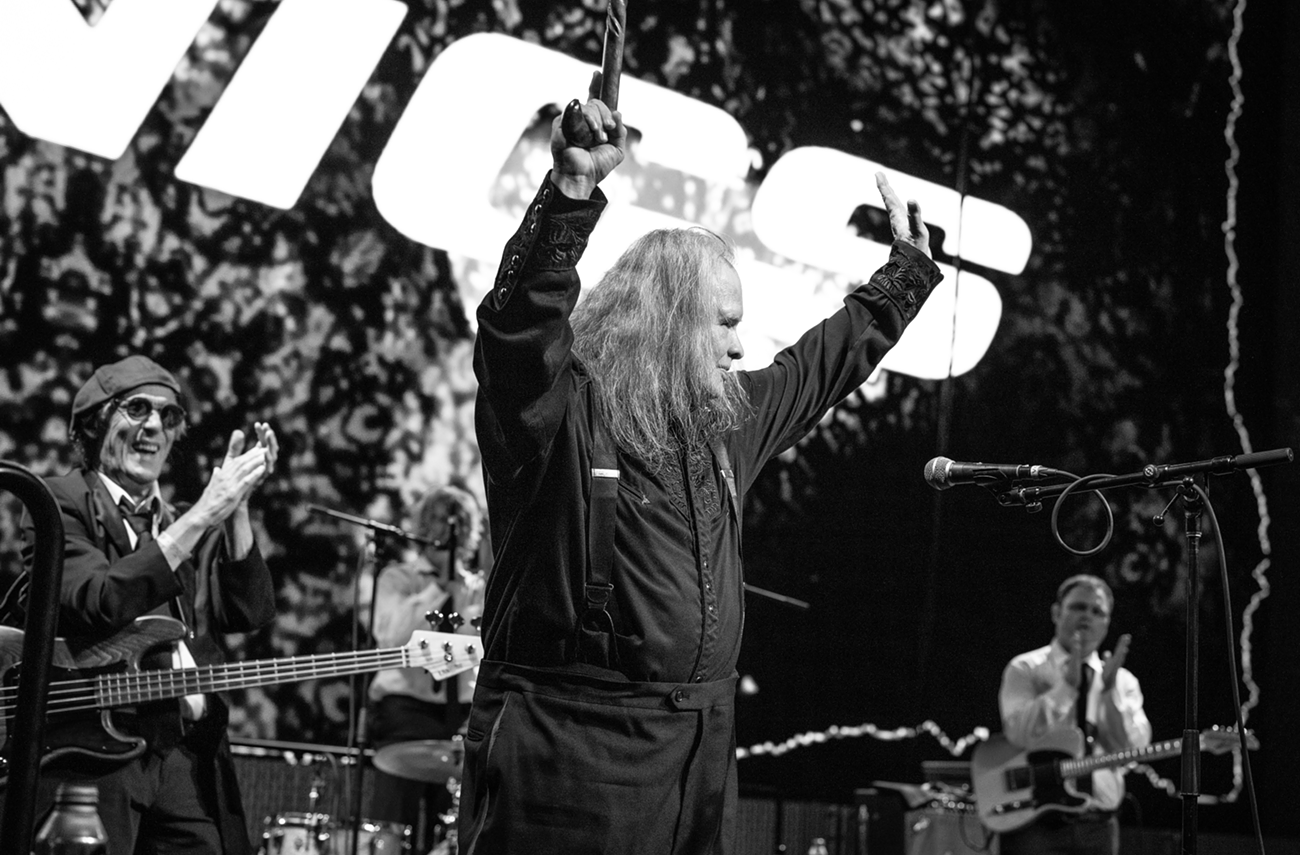On Saturday night, special guests (and the lucky few who snagged tickets) gathered at MoPOP’s Sky Church to honor a local legend: Tacoma’s greatest band, the Sonics.
The band helped define the sound of punk and garage rock from the beginning. And this weekend, the band had two things to celebrate: a show in honor of their 60th anniversary, and BOOM: A Film About the Sonics, the first definitive documentary on the essential punk rock band.
Written and directed by Jordan Albertsen, the documentary makes two enormous claims. First, it proposes—with the blunt authority of drummer Bob Bennett's beats—that its subject is one of the most important groups in rock history. And second, it asserts that the Tacoma-based Sonics invented punk about a decade before Ramones or the Sex Pistols. Albertsen spends a tight 77 minutes earnestly attempting to prove those claims.

Like the Sonics' first single, "The Witch," BOOM gets in, tells its story, and wraps up things efficiently. Like many music-oriented docs, BOOM offers a large roster of talking heads (more on them later) and a chronological narrative, but at least there are no cameos by Bono or Dave Grohl and no cringe animation interludes.
Originally released in 2018, BOOM stands as the definitive Sonics doc. But it also doubles as the story of Albertsen's staunch fandom and how his obsession led to this very film—one that every Sonics fan will want to watch. Albertsen's father turned him onto the Sonics when the director was 13, and they became his favorite band from the moment he heard track one on Boom ("Cinderella"). It was one of those "If you like Nirvana, you'll really like the Sonics" father-son teaching moments, and it created a lifelong bond. But the Sonics' lack of mass notoriety and mysteriousness nagged at Albertsen for years. The band's 2008 reunion—after decades of dormancy—instigated a 10-year mission to uncover the story of these five badasses.

Setting the scene, Albertsen presents black-and-white footage of Tacoma in its grimy, blue-collar glory in the '50s and '60s as we get introduced to the Sonics' members. We learn how each of the Sonics got started in music. Once old enough to attend shows, they took inspiration from the Wailers and Little Bill and the Blue Notes, Tacoma's biggest rock acts of the early '60s.
The band that hundreds of thousands of fans know and love formed in 1960 when the Parypa brothers (guitarist Larry and bassist Andy, who called their embryonic band the Sonics) joined forces with saxophonist Rob Lind, drummer Bennett, and singer/keyboardist Gerry Roslie of the Imperials. Wailers' members Buck Ormsby and Kent Morrill had formed Etiquette Records, which scored a hit with Rockin' Robin Roberts's "Louie Louie," and they were looking for the next big thing. The Sonics' blasting rock wowed Ormsby and he quickly realized that they had the special sauce.

Recording their first single for Etiquette, "The Witch," the Sonics blew out the speakers, the vacuum tubes, and the walls in the studio, which normally worked with radio and TV jingles. The studio's employees were aghast. Ormsby told the engineer that he wanted no compression. "I wanted blood to come off the walls." Thus, punk rock was born... in 1965.
Inspired by Little Richard and Jerry Lee Lewis, Roslie possessed the most robust, soulful pipes in all of garage rock and he had a knack for writing indelible hooks and riffs, which the Parypa bros and Lind executed with ferocity while Bennett slammed his skins with brutish power; he regularly broke heads, sticks, and pedals. The drummer's ballistic style inspired everyone in the group to crank up the intensity. It was all as organic and instinctual as that—no grand scheme to invent a new genre.
The Sonics' unique power was amply evident on "The Witch." Trouble was, the single met with resistance from radio DJs, including KJR shot-caller Pat O'Day. Initially refusing to play "The Witch," O'Day eventually relented after it began to chart at some smaller stations. But, as Larry Parypa remembers it, he would only air it after 3 pm because he believed this "devil music" would upset housewives.

After three albums and little notice outside of the Northwest, the Sonics disbanded and got jobs in the straight world (and the military). They had resigned themselves to being local legends who flared brightly yet briefly. Over the ensuing decades, they had no idea that the Sonics had become cult faves among garage-rock aficionados and musicians worldwide.
Albertsen ventured to London to interview members of Thee Headcoats and the Caezars as well as record-store owners, revealing how the Sonics' popularity bloomed in Europe. The band received help from Ormsby, who handed copies of Here Are the Sonics!!! and Boom to taste-makers on a European jaunt after his Etiquette label reissued them in the mid-'80s.
As for the talking heads, Albertsen's assembled a PNW hall of fame roster: Soundgarden's Kim Thayil, Heart's Nancy Wilson (the only woman interviewed), Mudhoney's Mark Arm, the Fastbacks' Kurt Bloch, and many more. Producer Jack Endino says that he wasn't aware of the Sonics until bands he was recording asked for "that Sonics drum sound." Pearl Jam's Mike McCready had the most succinct and accurate comment: "[The Sonics] sound dangerous."

The movie vividly captures the zeal of fans old and new with footage from the 2007 Cavestomp! fest reunion gigs and again at the 2015 Moore Theatre concert that celebrated the comeback LP, This Is the Sonics. The record's surprisingly great for a group that had been on hiatus for nearly 50 years. During these segments, there's an overwhelming sense that, finally, the Sonics are getting their just rewards. And these humble gents display deep gratitude and shock that people still care about this music from the LBJ era.
BOOM does have some flaws. There's some exaggeration about how obscure the Sonics have been ("Strychnine" appeared on the Nuggets compilation in 1984; "Psycho" graced the Rockabilly Psychosis and the Garage Disease comp that same year. Both inclusions significantly raised awareness of the band nationally and globally. There's no mention of the popular group LCD Soundsystem's 2002 cult hit "Losing My Edge," in which James Murphy repeatedly shouts out "THE SONICS!") Also, there's some imprecision with regard to dates. Norton Records licensed the first two Sonics albums in 1998, but Albertsen said it was the first time in 40 years that they had been distributed in the US. Nevertheless, the spirit of BOOM is as righteous and undeniable as Gerry Roslie's howl.
BOOM: A Film About the Sonics opens at the Grand in Tacoma Fri, Sept 13.




















